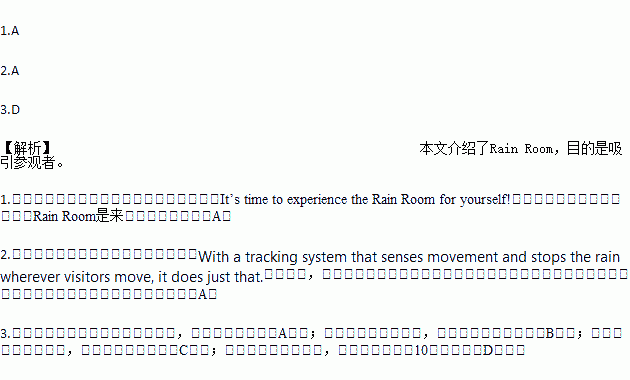题目内容
Inside the Rain Room
The Rain Room has arrived and local art lovers are taking notice. Is it worth the wait? Yes, I assure you it is. Once inside, visitors find a long, dark room with a high ceiling. A single bright light shines through heavy rain falling around visitors. The mist. The damp air. The noise. It feels like a mighty storm is pouring down. But the storm is inside. And visitors aren’t getting wet. Instead, visitors wander in awe, admiring the rain and the artists who created it.
The Rain Room was created to highlight the connection between humans, nature and technology. With a tracking system that senses movement and stops the rain wherever visitors move, it does just that. Light and sound produce an experience that feels both natural and foreign. The exhibit is moving on to Atlanta next month. I urge you to visit before then. It’s time to experience the Rain Room for yourself!
Welcome to the Rain Room
The Rain Room features falling water. Please be aware you may get slightly wet. However, visitors wearing raincoat will be turned away.
This exhibit features advanced technology. To ensure its effectiveness, please avoid wearing dark or reflective clothing.
Visitors are welcome to take photographs of the exhibit.
Children must be accompanied by an adult.
For the convenience of all guests, visits are limited to 10minutes.
1.What’s the purpose of the text?
A. To attract visitors to a new art exhibit.
B. To explain how an exhibit has been created.
C. To describe the technology used in the exhibit.
D. To promise the artists taking part in an exhibit.
2.What’s the function of the exhibit’s tracking system?
A. To keep visitors from getting wet.
B. To protect the exhibit from water damage.
C. To time how long visitors are in the room.
D. To count the number of visitors in the room.
3.What must you do when visiting the Rain Room?
A. Wear a raincoat
B. Wear dark clothing
C. Leave your camera outside.
D. Pass through within 10 minutes.


 ogy Sydney, made From Sydney With Love about two Indian students falling in love with some of the 8. (building) of Sydney University. By 2014, the number of Indian students in Australia was rising again.
ogy Sydney, made From Sydney With Love about two Indian students falling in love with some of the 8. (building) of Sydney University. By 2014, the number of Indian students in Australia was rising again.